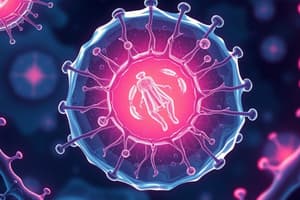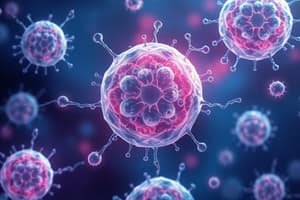Podcast
Questions and Answers
What is another word for specialized?
What is another word for specialized?
differentiated
Only unicellular organisms have specialized cells.
Only unicellular organisms have specialized cells.
False (B)
What are stem cells before they become specialized?
What are stem cells before they become specialized?
- Stem cells (correct)
- Differentiated cells
- Progenitor cells
- Embryonic cells
What signals do stem cells receive to become specialized?
What signals do stem cells receive to become specialized?
What is the function of neuron cells?
What is the function of neuron cells?
What unique structure do red blood cells have to increase their oxygen-carrying capacity?
What unique structure do red blood cells have to increase their oxygen-carrying capacity?
The function of sperm cells is to _____ to the egg.
The function of sperm cells is to _____ to the egg.
What is the structure of muscle cells that facilitates movement?
What is the structure of muscle cells that facilitates movement?
What do white blood cells do?
What do white blood cells do?
What is the primary function of small intestine cells?
What is the primary function of small intestine cells?
Flashcards are hidden until you start studying
Study Notes
Specialized Cells
- Specialized cells have a specific function in the body, also called differentiated cells.
- Only multicellular eukaryotic organisms have specialized cells.
- Before cells are specialized, they are called stem cells.
- All the DNA in each of your cells is the same; your DNA is your genome.
How cells become specialized
- Stem cells receive signals, called hormones, to become specialized.
- Using the directions in the signals, DNA turns on or off specific genes.
- Based on the activated genes, the cell grows specific structures.
- As a result of these structures, the cell can do its specific function and can never go back to being a stem cell.
Neuron Cell
- Sends messages around the body.
- Has dendrites that connect to other nerves and an axon insulated for fast message transmission.
Red Blood Cell
- Delivers oxygen throughout the body.
- Very small and flexible.
- Loses its nucleus to increase surface area for carrying oxygen.
Sperm Cell
- Swims to the egg.
- Has a flagellum (tail) for swimming.
- Contains lots of mitochondria to provide energy.
Egg Cell
- Grows and divides to form an embryo.
- Extra large with protective outer layers.
White Blood Cell
- Fights disease.
- Produces antibodies to recognize infections.
- Contains enzymes to break down invaders.
Small Intestine Cell
- Absorbs nutrients.
- Has microvilli, finger-like folds that increase the surface area for absorption.
Pancreatic Cell
- Synthesizes, stores, and releases hormones.
- Beta islet cells have lots of ribosomes to make the insulin protein.
- Insulin is received by a receptor protein on the cell surface which opens transport proteins to let glucose into the cell.
Bronchial Cells
- Moistens and protects airways from pathogens to promote gas exchange.
- Ciliated cells produce and sweep mucous which traps irritants and pathogens.
Muscle Cells
- Responsible for movement and support.
- Contain myofibrils, actin and myosin protein fibers, that contract causing movement.
Studying That Suits You
Use AI to generate personalized quizzes and flashcards to suit your learning preferences.




